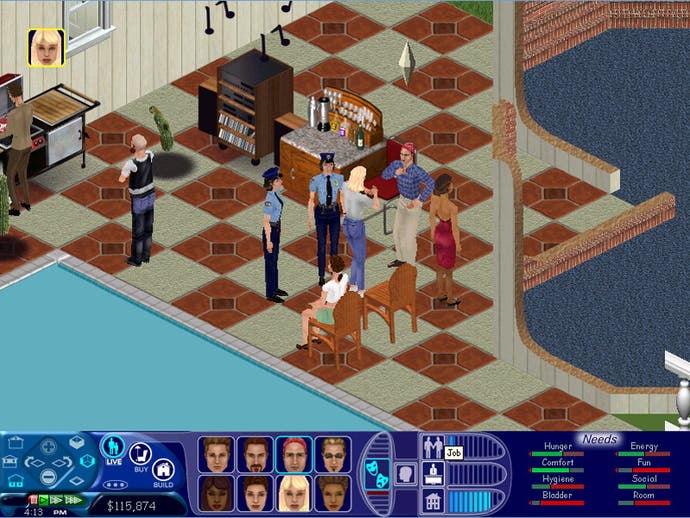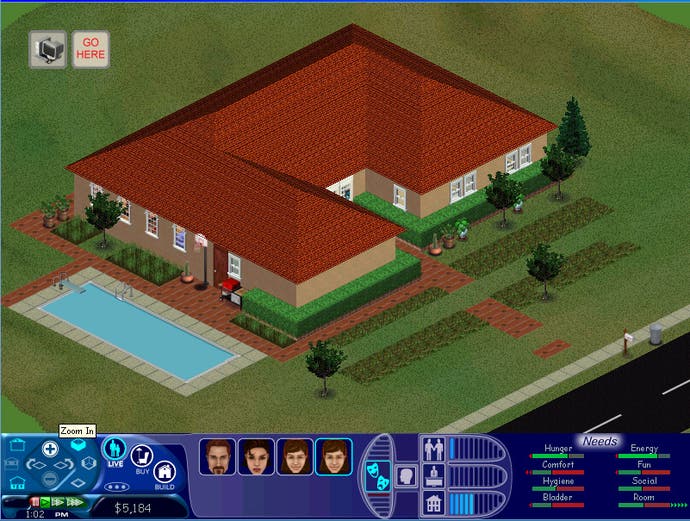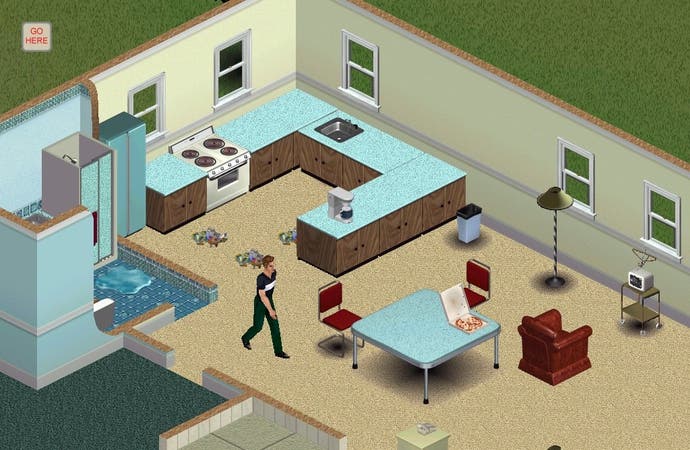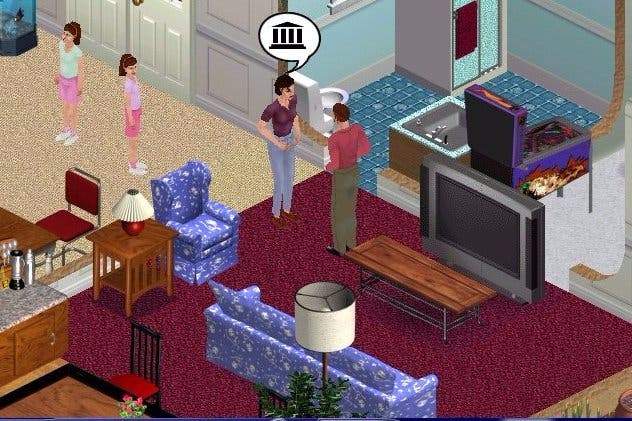The Sims' social simulation is even more affecting now than it was 15 years ago
Splines they are a changin'. Looking back at Maxis' original.
I can still remember the first family I created. On the fifth of February 2000, the day after The Sims launched, Mr and Mrs Bead moved into the single-bedroom bungalow located at 2 Sim Lane. Mr Bead was a slim, gentlemanly figure with neatly-cut black hair and pencil moustache, while Mrs Bead looked exactly like the Sim displayed in the bottom-middle square on the cover of the game box, turquoise dress and all.
The Beads were never rich, but they ground out a quaint and pleasant living for themselves, and they loved each other deeply. Mr Bead had a steady career in the police, while Mrs Bead looked after the house and sold artwork in her spare time. At some point they might have had a baby, but I can't quite recall. It was 15 years ago, so a few of the details are a little muddled.
I'd like to say that the Beads lived happily ever after, but that would be a lie. One day while Mrs Bead was cooking some lunch, the cheap stove in the Bead kitchen burst into flames. Mrs Bead rushed to the phone and rang the fire brigade. But the fire spread quickly, and so she bravely tried to extinguish it by herself. Instead, the fire extinguished Mrs Bead, and when Mr Bead came home that evening, it was to a pile of his wife's ashes. There might have been a last-minute redemption in the form of a cheeky quickload. But either way, I moved on from the Beads not long after that. It felt like the right time.

I have lots of childhood memories that revolve around playing games. Most of them are snapshots of who I was with at the time; playing Jungle Strike with my dad, or Worms at my nan's house, or Unreal Tournament with my brother. But when it comes to memories of something that happened within a game, nothing is quite as vivid as the life and death of Mrs Bead.
There are various reasons that for this. It was one of the first games I played where emergent stories were in the foreground. But I also think there's a simpler reason; upon its release, we'd never seen anything quite like The Sims before. At a time when John Romero wanted to make you his bitch and Peter Molyneux wanted to make you a god, along came a game in which it took three hours to make breakfast.
Even Maxis didn't understand the nuclear money-bomb they had ticking in their basement. In an interview with Kieron Gillen from 2008, Will Wright explains that in-house The Sims was derogatorily referred to as "The Toilet Game" because you could clean the toilet, while much of the development was done in secret by just one or two developers after the studio heads refused to publish it. Even when it was released, that internal uncertainty remained. The blurb of the box curiously heralds The Sims as "a new strategy game that really hits close to home!", epitomising why you should never trust anyone wearing a suit to have an idea about anything.
But The Sims is not a toilet game, and neither is it a strategy game. It's a celebration of the mundane. It reflected and applauded everyday life where every other game desperately tried to escape it. And the thing about everyday life is that everybody can relate to it. As observations go that is utterly insipid, but back in 2000 it took Will Wright to realise it.
Indeed, the genius of The Sims is as much in how its ideas are presented as it is the ideas themselves. I was once told by a primary school teacher never to use the word "nice" to describe anything. But I'm the goddamn writer here Mrs Mason, and I'll tell you right now the Sims is one of the nicest-looking games ever made. Its colour palette, mainly comprised of soft pastille shades, is expertly applied to blend the pre-rendered backgrounds and objects with its full 3D character models. The result was, and I'm channelling my inner estate agent here, virtual homes that are cosy and inviting spaces ideal for family life.

The quietly cheerful aesthetic is complemented by one of the best and most underrated game soundtracks in all of gaming. From the soap opera-esque ditty that plays when you first launch the game, to the delightfully elegant piano and string tracks that play over the Buy and Build modes, the compositions of Mark Russo and Jerry Martin wordlessly encapsulate the tone and actions of each part of the game. Should you doubt this, stick on "Buy Mode 2" next time you're browsing Amazon, and marvel at how it fits like a glove.
None of this is to dismiss the importance of the cogs working underneath, and the effort required to fit them together. The Sims is obviously a landmark game in terms of social simulation. It's AI is not as evidently remarkable as that of Black & White, released the following year. But this is also why The Sims is a more coherent and consistently enjoyable game than Lionhead's flawed masterpiece.
Maxis designed its AI agents so they were just smart enough to have a rudimentary level of autonomy. They mimic free will by picking random objects to interact with, and satisfy their needs by responding to unseen calls from in-game objects. The Sims live in a world in which fridges constantly shout "I WILL DECREASE YOUR HUNGER BY 50" and unemptied bins scream "I WILL DIMINISH YOUR HYGIENE BY X POINTS PER SECOND WHILE YOU STAND IN THIS ROOM." Yet The Sims are deliberately poor at organising and prioritising, and stopping them from ultimately wetting themselves and dying requires the player's intervention. The thinking at Maxis was not, "How do we create human-like AI," but "How do we make a game about washing the dishes interesting to play?" and this shows in the final product.
When you understand that, other design decisions make much more sense. A good example is why every action The Sims perform seems to take so bloody long. I remember being constantly frustrated by the fact that there never seem like enough time in the day to fit everything in. Yet that constant spinning of plates, the morning rush to catch the schoolbus, the desperation to squeeze in an hour of novel writing between all the daily chores, is exactly what keeps your mind active in a game that could so easily descend into monotonous routine.

Not only that, but returning to it in adulthood some 15 years later, I realise that this more or less exactly what life is like: a perpetual battle against time that only ever seems to accelerate, where some days the only apparent control is whether or not you flip a V to the clock as you rush to deal with the next item on your schedule.
Other aspects of The Sims' social simulation haven't aged quite so astutely. When I launched a new game and saw that you start with 20,000 Simoleons, using which you can buy and furnish a house, I burst out laughing. A more accurate The Sims would add a minus to that initial number, while the price of every property would read LOLGTFO.
Or maybe that's the wrong way to look at it. Maybe the fact that a game designed to reflect modern life 15 years ago feels increasingly like another escapist power fantasy is a sad indictment of our society. Seeing positive numbers in my virtual bank account is an unreal pleasure, as is the ability to jump into buy mode and purchase stuff without being struck by a wave of guilt. Perhaps EA will fix these obvious flaws in The Sims 5: Millennial Edition, where buying a new phone earns you the scorn of elderly relatives because you should be saving every penny for that single-bedroom flat you might be able to afford in the year 2095, while the ability to feasibly support children unlocks around retirement age.
Whether this is just me coming to The Sims very different angle of experience, or indicative of a more worrying social and cultural shift, my affection for the actual game hasn't diminished at all.
I'd recommend it over any of the sequels, whose Stepford Wives levels of cheerfulness and more ambition-driven social simulation I find distasteful (and let's not talk about the whole expansion culture - I've dealt out enough cynicism for one day). The original, pre-success Sims understood that the default setting for life should be peace, where a homes are affordable and it's easy to live without threat of destitution or death. Such notions deserve to make it a timeless classic, one which I think we'd all do well to remember.



